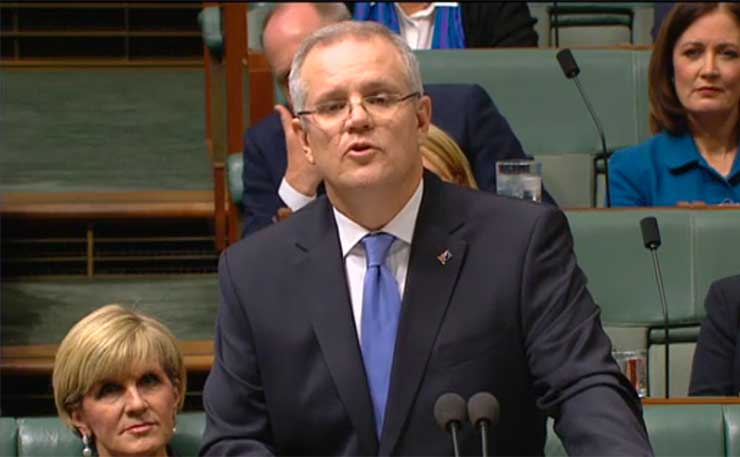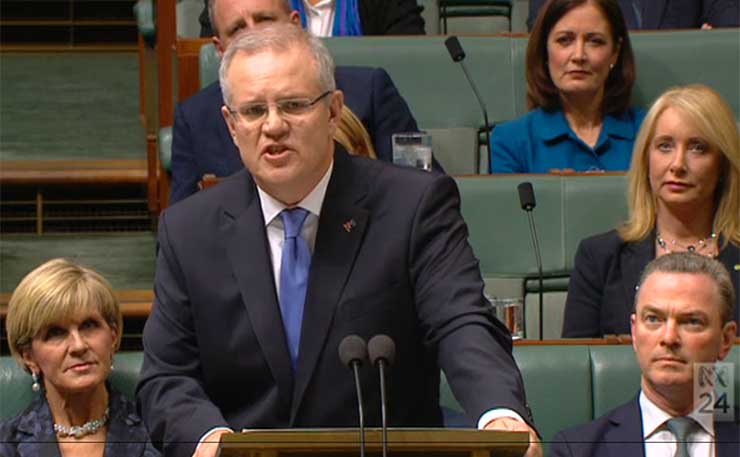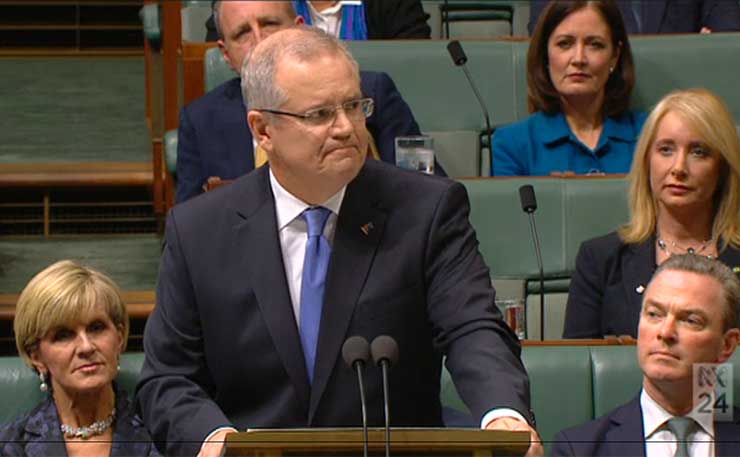Last week, Treasurer Scott Morrison delivered a major speech on economic and tax reform in Australia. New Matilda economist Ian McAuley is still scratching his head.
As a policy statement, all that Scott Morrison’s speech last week achieved was confirmation that the government is floundering in its attempt to develop a coherent economic policy.
His speech has basic factual errors (particularly about who does and doesn’t pay tax), its discourse on debt is muddled (in confusing government debt and national debt), and it reveals no awareness of pressing structural challenges facing the Australian economy (worsening inequality, climate change and the dearth of productive public and private investment).
I deal with each deficiency in turn below
“The new divide – the taxed and the taxed nots”
Here was an opportunity to state categorically that we need to increase our taxes, and to make those who are well-off pay their share. Instead we have been presented with a rambling discourse, dominated by his claim that there is a large proportion of Australians who “go through their entire lives without ever paying tax”.
That is plain wrong.
This year the Commonwealth is budgeted to collect $59 billion in GST, and $25 billion in excise and customs duty on tobacco, fuels and certain imports. That’s around $9,000 a household, in taxes that are practically impossible to avoid. Not even a Carmelite nun can avoid the GST.
And that’s before we consider state taxes such as drivers’ licences and car registration fees, and state and local government property taxes paid directly by homeowners or by tenants through their landlords.
Most of these taxes are regressive. The lower one’s income, the higher is the proportion of that income devoted to consumption and therefore to paying the GST, and the registration fees for a Corolla and a Porsche are pretty much the same.
That’s not to mention road tolls, private health insurance, fees at government schools and higher co-payments in health, all of which are high-cost privatised means of paying what we could be paying more fairly and efficiently through our taxes.
Morrison reluctantly admits that Australia has a public revenue problem, but he fails to acknowledge the yawning gap between what we presently collect in taxes and what we should be collecting if we are to fund adequately the public goods and a social security system appropriate for a high income country.
Our tax collections, as a percentage of GDP, are close to the lowest of all OECD countries – among prosperous developed countries only the USA collects less tax, and contrary to partisan spin, our taxes are falling.
Over the early years of this century Commonwealth taxes were around 24 per cent of GDP, before plummeting to 20 percent during the GFC and recovering to only 22 per cent now.

If we could lift our taxes to the OECD average we’d be collecting another eight to ten per cent of GDP. Each percentage of GDP is about $16 billion a year: that’s real money to fund education, infrastructure and among other things a properly-resourced statistical agency.
If the Government is serious about identifying the undertaxed it’s not hard to find them – multinational corporations that shift revenue to tax havens, coal mining firms that don’t pay for their contribution to global warming, small businesspeople who avoid taxes through family trusts, residential property speculators who benefit from lax rules on capital gains and “negative gearing”, so-called “self-funded” retirees who pay no tax on pension fund earnings, high-income individuals who avoid the Medicare Levy Surcharge by holding private health insurance, and all the corporate rent-seekers who have enjoyed largesse from successive governments.
“The worst case scenario will see our gross debt exceed $1 trillion in a decade”
Morrison’s comments on debt are a confusing muddle of figures on national debt and Commonwealth Government debt.
When ratings agencies warn that Australia has a debt problem their main concern is our national debt rather than our government debt.
Our national debt is what we owe the rest of the world. Over just 30 years, that has doubled from 30 per cent to 60 per cent of GDP, meaning it has already hit $1 trillion. Most of that is private debt, a legacy of our profligate dependence on foreign capital.
Commonwealth Government net debt is about $330 billion, or 18 percent of GDP, and the only way it could get to be anywhere near a trillion would be if the government goes on giving undeserved handouts to the well-off.
For partisan impact, Morrison uses the figure of $430 million of Commonwealth Government debt (a “gross” figure that fails to offset government financial assets), but he does admit that our government debt “is low by global standards”. Yet he goes on to press the case for reducing public debt, while ignoring private debt.
He expresses concern for the government debt to be paid off in future generations, but is callously indifferent to the huge private debt younger Australians face for tertiary education and housing. Somehow public debt is bad, but private debt doesn’t matter.
If I can summarise the bureaucratic and partisan gibberish of his discourse on debt, it goes something like this:
We have had a heap of foreign investment in our country, but all it has given us is a highly-inflated housing market and some abandoned mining projects. These private investors and speculators have used up all our national capacity to borrow, and therefore it’s the government that has to rein in its borrowing. That’s why we’re not investing in productive public infrastructure – a proper NBN, surface transport, education. Furthermore record low interest rates haven’t stimulated productive private investment, but don’t worry, because we’re proposing big tax breaks for foreign firms in the hope that their future foreign investment will be more beneficial to Australia than it has been in the past.
If we draw on standard economic wisdom – the IMF, the OECD, statements by the retiring Reserve Bank Governor – there is a case for our government to run a balanced budget for recurrent expenditure, but to take on more debt to finance productive public infrastructure, taking advantage of low long-term bond rates. Just as a well-run corporation borrows for productive investment, so can (and should) a government.
But although the Liberal Party makes much of its supposed understanding of business, Morrison, like his predecessor Hockey, shows that he doesn’t understand the business of government from a balance sheet perspective – a perspective that clearly differentiates between capital and recurrent expenditure.

Strangely enough, this section of his speech has a dispassionate outline of economic developments in the Chinese economy, clearly differentiating between that country’s foreign and government debt, and drawing the distinction between infrastructure and recurrent spending.
When it turns to the Australian economy, however, it reverts to meaningless gobbledygook. I suspect that the early drafts, before senior managers in Treasury applied the requisite political spin, may have been reasonably intelligible.
“An economic plan for jobs and growth”
Morrison’s speech is not an economic plan for anything. Here and there it touches on some of the structural problems faced by the Australian economy, but its omissions are glaring.
No mention of worsening inequality and the threats posed to our whole political and economic system. No mention of climate change. No mention of an incipient housing bubble. No mention of our deficits in education and infrastructure.
Here was an opportunity for a senior minister in the Turnbull Government to show leadership, to show that it has a firmer grasp on economic policy than the Abbott-Hockey Government, and to call on the privileged to contribute to the public purpose.
Instead we have been presented with a string of patronising clichés and partisan drivel.
Donate To New Matilda
New Matilda is a small, independent media outlet. We survive through reader contributions, and never losing a lawsuit. If you got something from this article, giving something back helps us to continue speaking truth to power. Every little bit counts.





